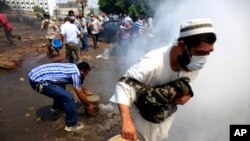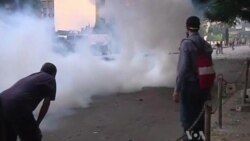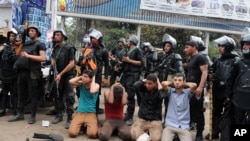CAIRO —
At the largest sit-in near the Raba'a Adawiya Mosque in northern Cairo, police and army troops fired tear gas and pushed into parts of the sprawling square. Fires burned inside the camp and clouds of tear gas filled the air. Several top Muslim Brotherhood leaders were reportedly arrested.
Amid the widening conflict, the leader of Egypt's venerable al-Azhar University, Sheikh Ahmed Tayyeb, urged everyone to avoid violence and political leaders to sit down at the negotiating table.
He said violence will never be a solution to the conflict and urges everyone to use wisdom and common sense to find a political solution. He adds that he was not informed of the decision to storm the sit-ins.
Violence and vandalism also struck other parts of Egypt as Muslim Brotherhood supporters ransacked and burned the provincial governor's office in Alexandria and government headquarters in Fayyoum. Al-Arabiya TV reported four churches were torched in the south of the country.
A rival Islamist group to the Muslim Brotherhood, the Salafi Nour Party, urged Egyptians to “stop attacking government buildings and churches.” The Nour Party has refused to join the interim government, but has criticized the Muslim Brotherhood for not participating in the political process since the ouster of Morsi.
Watch related video by VOA's Elizabeth Arrott:
A spokesman for the interim government deplored the loss of life and insisted that a road map for a return to democracy, announced at the beginning of July, would go ahead.
He said the government will continue with its political road map, despite the violence, and urges all political forces to participate.
But Muslim Brotherhood spokesman Mohamed Beltagy denounced the Egyptian military for what he claimed was a “massacre,” and insisted a “military coup” had “failed.” Speaking in angry tones, he said his group would continue its protests.
He accused the Egyptian military of killing protesters in cold blood, using snipers on top of buildings and claimed there was no room for the bodies at the hospital. He called on Egyptian soldiers to mutiny. Casualty figures he cited varied widely from those being reported.
Turkish Prime Minister Recep Tayyip Erdogan, whose party has close ties to the Muslim Brotherhood, condemned what he claimed was a “massacre,” and urged the United Nations to investigate.
The Egyptian army says an operation to clear two sit-in protest camps of Muslim Brotherhood supporters in Cairo is almost over, amid conflicting reports on the number of casualties.
The interim government says 278 people, including 43 policemen, were killed Wednesday.
But a spokesman for the Muslim Brotherhood, which demands ousted President Mohamed Morsi be returned to power, says 2,600 people were killed when police fired into crowds of demonstrators with automatic rifles.
Egypt's interim vice president, pro-reform leader Mohamed ElBaradei, resigned, saying he could not bear responsibility for decisions he "does not agree with and whose consequences" he fears.
Violent clashes spread across Cairo and many parts of Egypt, after government security forces moved to disperse Muslim Brotherhood supporters at two protest camps in the capital. The two sit-ins began more than 40 days ago, after the army ousted Islamist President Mohamed Morsi.
Security forces succeeded quickly in breaking up the second and smaller of the two sit-ins near Cairo University, arresting dozens of people. Bulldozers cleared bricks and sandbags from the street, as soldiers knocked down tents and set fire to political posters.
The interim government says 278 people, including 43 policemen, were killed Wednesday.
But a spokesman for the Muslim Brotherhood, which demands ousted President Mohamed Morsi be returned to power, says 2,600 people were killed when police fired into crowds of demonstrators with automatic rifles.
Egypt's interim vice president, pro-reform leader Mohamed ElBaradei, resigned, saying he could not bear responsibility for decisions he "does not agree with and whose consequences" he fears.
Violent clashes spread across Cairo and many parts of Egypt, after government security forces moved to disperse Muslim Brotherhood supporters at two protest camps in the capital. The two sit-ins began more than 40 days ago, after the army ousted Islamist President Mohamed Morsi.
Security forces succeeded quickly in breaking up the second and smaller of the two sit-ins near Cairo University, arresting dozens of people. Bulldozers cleared bricks and sandbags from the street, as soldiers knocked down tents and set fire to political posters.
Egypt's State of Emergency
Egypt's State of Emergency
-Egypt declared a state of emergency (SOE) to restore civil order
-Announced Aug. 14 at 4 p.m. local time via state TV
-SOE to last one month
-Egyptian military forces have wide range of authority without challenge from a second or third party
-May enforce curfews, close institutions, detain anyone at will, keep people in detention as long as they deem necessary and enforce travel restrictions
-Announced Aug. 14 at 4 p.m. local time via state TV
-SOE to last one month
-Egyptian military forces have wide range of authority without challenge from a second or third party
-May enforce curfews, close institutions, detain anyone at will, keep people in detention as long as they deem necessary and enforce travel restrictions
Amid the widening conflict, the leader of Egypt's venerable al-Azhar University, Sheikh Ahmed Tayyeb, urged everyone to avoid violence and political leaders to sit down at the negotiating table.
He said violence will never be a solution to the conflict and urges everyone to use wisdom and common sense to find a political solution. He adds that he was not informed of the decision to storm the sit-ins.
A rival Islamist group to the Muslim Brotherhood, the Salafi Nour Party, urged Egyptians to “stop attacking government buildings and churches.” The Nour Party has refused to join the interim government, but has criticized the Muslim Brotherhood for not participating in the political process since the ouster of Morsi.
Watch related video by VOA's Elizabeth Arrott:
He said the government will continue with its political road map, despite the violence, and urges all political forces to participate.
But Muslim Brotherhood spokesman Mohamed Beltagy denounced the Egyptian military for what he claimed was a “massacre,” and insisted a “military coup” had “failed.” Speaking in angry tones, he said his group would continue its protests.
He accused the Egyptian military of killing protesters in cold blood, using snipers on top of buildings and claimed there was no room for the bodies at the hospital. He called on Egyptian soldiers to mutiny. Casualty figures he cited varied widely from those being reported.
Turkish Prime Minister Recep Tayyip Erdogan, whose party has close ties to the Muslim Brotherhood, condemned what he claimed was a “massacre,” and urged the United Nations to investigate.







